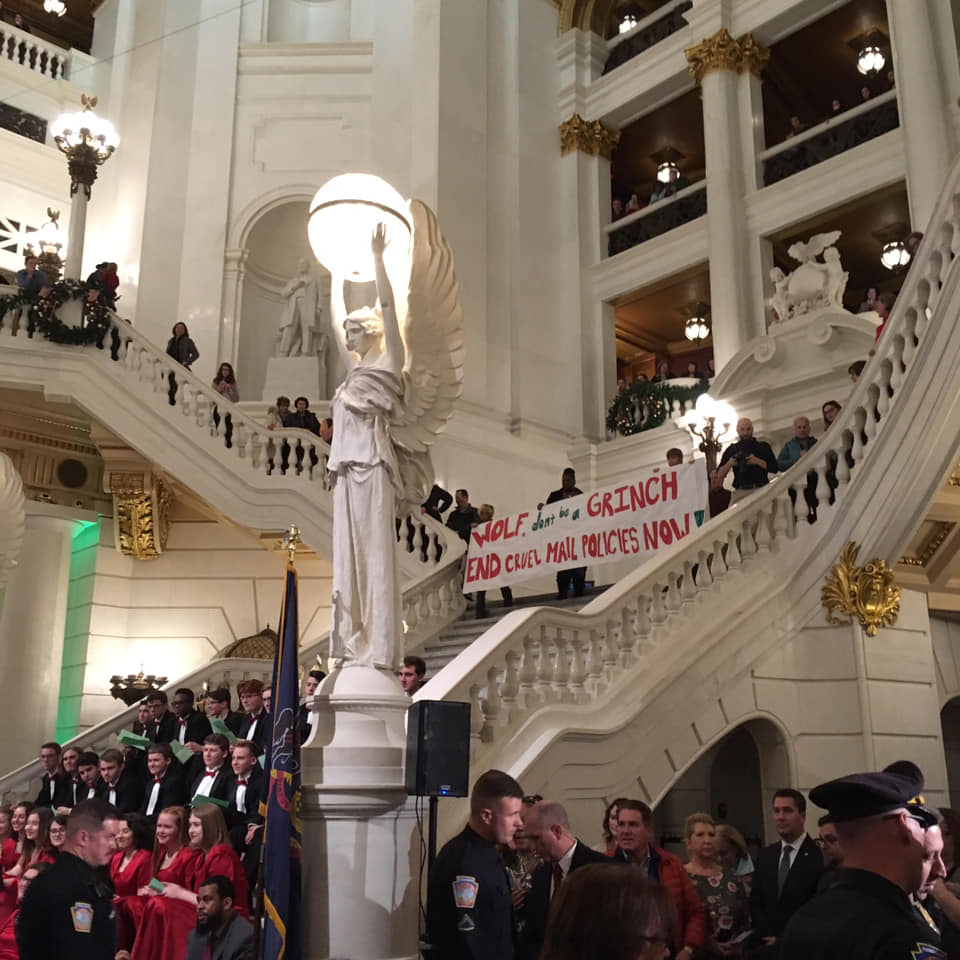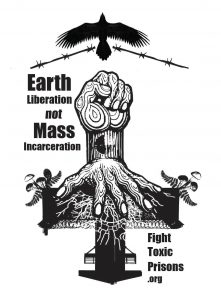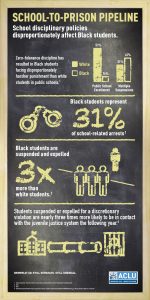Editor’s note: Shandre Delaney’s son, Carrington Keys, was released from prison on May 15, 2018, after serving 20 years. He spent 10 of those years in solitary confinement. Since then, she has become a vocal advocate for her son and all prisoners. Read her piece with the Community Based News Room here. She is a regular CBNR contributor on criminal justice.
In December, I usually am filled with holiday spirit. A tradition of mine is to send cards to prisoners with beautiful winter scenery and messages of hope and encouragement for the coming year. Prisoners anticipate and appreciate these cards as an intimate connection to their family and the outside. This year, it’s going to be different.
In August, the Pennsylvania governor and Department of Corrections made a hasty decision to sign a $15 million contract with Smart Communications to handle prison mail for “security” reasons. Mail now goes from Pennsylvania to Florida, where it is scanned and then emailed back to Pennsylvania prisons to be printed and delivered to prisoners. This routine sometimes takes up to 3 three weeks.
Prisoners are losing the connection to their loved ones. Heartwarming cards and family photos are now one-page, black-and-white photocopies, which are not very warm. Protesters from Human Rights Coalition and Decarcerate interrupted the annual Christmas tree lighting to let the governor of Pennsylvania know that his mail policies are hurting us and our loved ones.

Communication with family is one of the keys to a successful rehabilitation. If prisoner family members in Pennsylvania had a wish, it would be for their loved ones to receive real cards and photos, not photocopies. We wish that our governor would favor the feelings of taxpaying prisoner families over prison profiteer kickbacks.
While we are being forced to send mail to Florida, there also is a strain on face-to-face visits. Food has been removed from vending machines in the visiting rooms. Those who have illnesses, such as diabetes, or babies and children are deterred from visiting because of the lack of food and water in the visiting rooms. New ion scanners have caused an alarming rate of false positives where innocent people are being accused of ingesting or coming into contact with drugs. Family members are afraid that their visits will be terminated if they are falsely scanned.
We, being family members and prison advocates, believe these policies are an attempt to force the use of virtual visits, another high-priced contract where the DOC likely will receive kickbacks for its partnership.
On New Year’s Eve, when we are counting down to the new year, over 2.3 million Americans will be serving time in jails, prisons and under supervision. Of those incarcerated, 80,000 to 100,000 individuals are in solitary confinement, and 450,000 are in city and county jails because they can’t afford bail. Others are dying behind bars due to a refusal or lack of proper medical care.
While I am thinking of my New Year’s resolutions and goals for the year, I also will be thinking of prisoners. What would make 2019 better for those inside the walls? What gives them hope? Do they have visions for the coming year?
For 2019, we should focus on the work being done and how we can support it because mass incarceration impacts us all in one way or another. It is important to highlight those who are doing the work to help prisoners. Change cannot come about without unity and mass support. The end goal of prisoner advocacy is complete prison abolition that would look like restorative and transformative justice instead of mass incarceration and electronic supervision.
I am hoping for many outcomes for mass incarceration this year. My wishes for 2019 for are many but I have narrowed it down to my top nine.
Top Nine For 2019
1. Abolish the 13th Amendment
The 13th Amendment states: “Neither slavery nor involuntary servitude, except as a punishment for crime whereof the party shall have been duly convicted, shall exist within the United States, or any place subject to their jurisdiction.” What this means: Slavery did not really end. If you are convicted of a crime, it is legal to punish you with forced labor.
Capitalized prison labor is the modern-day slavery. The chain gangs of earlier times are now call centers and factories, where companies such as Verizon, Victoria’s Secret, and McDonald’s make millions using the labor of modern-day slaves.
For years, I have spoken out on how stagnant wages and a slow job rate were the effects of modern-day slavery. Jobs are not just being outsourced to other countries. They are being transitioned into prisons in our own country. People thought I was extreme when I would speak of it. In August 2017, the Millions for Prisoners Human Rights held a march and rally focusing on abolishing the 13th Amendment. In the past couple of years, there have been several prisoner led works strikes and the development of a union for prisoners.
Learn more about the 13th Amendment and the work being done to abolish i
2. Abolish Solitary Confinement
“Inmates in solitary confinement are sometimes treated so bad, that we are forced to take all necessary means to counter the mistreatment. Writing a letter to any branch of government is just not a reasonable alternative, when a prisoner has not eaten in weeks.”— Carrington Keys
Solitary confinement is the inhumane practice of isolating prisoners 24 hours a day for seven days a week. The United Nations Special Rapporteur, who visited United States solitary units, including those in Pennsylvania, identified that anything after 15 days is a detriment to the prisoner’s psyche and spirit and recommended that the U.S. end the practice.
Prisoners placed in solitary are not just the worst of the worst. They also are those who are being retaliated against for standing up against injustices within the prison. It is used as storage for the mentally ill and those who have no other place to go.
I work with Human Rights Coalition, which receives hundreds of letters a month detailing abuses in solitary confinement such as starvation, mental and physical abuse, and medical neglect. My son spent 10 years in solitary confinement because he was a jailhouse lawyer and prison activist. He was a part of a group of men known as the Dallas 6, who held a peaceful protest against abuses in solitary confinement at SCI Dallas in eastern Pennsylvania.
Currently, HRC is working with senators on HB 2214 that would limit isolation to no more than 15 days. This bill would encompass any place of incarceration in Pennsylvania be it local, state, federal or immigrant detention center.
Learn more about Human Rights Coalition.
3. Fair Sentencing
“Only a justice system predicated on vengeance could justify such a sentence that holds children to the same accountability standards as adults.”—Saleem Holbrook
Robert Saleem Holbrook, one of the prisoner founders of Human Rights Coalition, was sentenced as a juvenile in Philadelphia at the age of 16 for being a lookout in a drug deal that went bad. He spent over two decades in prison before he was released in 2017 based on the decision of Miller v. Alabama that ruled imposing mandatory life sentences without the possibility of parole on juveniles violates the Eighth Amendment of U.S. Constitution.
Saleem was one of about 400 juveniles in Pennsylvania who were sentenced to life without parole. Overall, there are over 2,500 juveniles serving life without parole in the U.S. Those who were under 18 are being released or resentenced, but the plight of those over 18 is being challenged as well, as the maturity level has been determined to be at age 25. Another rarely discussed issue with sentencing is the incarceration of the elderly. There is a growing consensus that they should be released since they are no harm and it costs more to keep them incarcerated.
Learn more about sentencing issues from the following groups.
Life without parole/juvenile sentencing from these groups: Families Against Mandatory Minimums CADBI and CADBI West Fight For Lifers and Fight For Lifers West Lifers With Optimistic Progress
Releasing elderly prisoners: RAPP
Sentencing reform: Sentencing Project and Abolishing Life Sentences
4. Voting Rights
In November, Floridians voted on Amendment 4, which gave more than 1 million ex-felons the right to vote. This result was a huge victory.
Each state has different approaches to disenfranchisement of felons. The only states where felons don’t lose their rights while incarcerated are Maine and Vermont. In 14 states and the District of Columbia, they lose their voting rights while incarcerated but they are restored upon release. In 22 states, felons lose their voting rights during incarceration, and then for a while after. They also may have to pay fines or restitution before their rights are restored. In 12 states, felons lose their voting rights indefinitely for certain crimes.
Get more information on voting right restoration.

5. #FightToxicPrison—Environmental Issues
“Drinking contaminated toxic water, an overwhelming majority of the inmate population experienced bouts of diarrhea, vomiting, sore throats and dizziness. This isn’t and cannot be construed as an isolated incident.”—Bryant Arroyo, jailhouse environmentalist
Bryant Arroyo is known for successfully fighting for environmental justice for Pennsylvania prisoners. He has organized hundreds of prisoners in joining environmental groups on the outside in fighting plans for a coal plant next to SCI Frackville in eastern Pennsylvania—where he is serving a life sentence without parole for a crime he did not commit, an unjust conviction he still is fighting. He also has brought attention to the water crisis at SCI Frackville.
With so many other injustices going on, we don’t realize the environmental issues happening inside our prisons. Prisoners are subjected to the same conditions as the residents in Flint, Mich. Pennsylvania has many antiquated prisons with plumbing and infrastructure to match. Our organization receives many complaints about brown, stinky water; toxic air quality and black mold.
In November, The Campaign to Fight Toxic Prisons and the Abolitionist Law Center (ALC) filed a federal environmental lawsuit against the Bureau of Prisons (BOP), which represents prisoners who were not properly informed about plans to build a new federal prison on the site of a former coal mine. Twenty-one prisoners are listed as plaintiffs, along with the ALC. The prisoners want the courts to halt progress until they have had time to access and review the documents. View the filing for the case here and pictures here.
Learn more about the intersection of prison and environmental Justice here.
6. End Cash Bail/Bail Funds
“We already know that the justice system is biased and leans in favor of those that have the finances to have better representation, or at least proper representation. If you come from a poor, disenfranchised, typically black and brown community, we don’t get the same kind of justice. It’s cruel to think that a monetary amount would [determine] whether you are a better person or not in the eyes of the law.”—Akeem Browder
Akeem’s brother, 16-year-old Kalief Browder, was accused of stealing a backpack and was imprisoned at Rikers Island in New York for more than three years before going to court, when he was finally freed due to lack of evidence.
Two years later, he was dead from suicide.
His experiences, while incarcerated, had done harm to his psyche. The highly publicized case brought attention to the U.S. bail system that penalizes poor and marginalized people. Those who cannot afford to pay are held, sometimes years at a time, before even getting into court and being found innocent. ‘
In 2019, California will become the first state to end cash bail, while Philadelphia has ended cash bail for certain crimes. In Maryland, cash bail is a last resort.
For more information, visit Bail Project, The Bronx Freedom Fund, National Bailout and Philly Bail Fund.
7. Health Care
“A simple jail stay shouldn’t end in a death sentence.”
Shandre Delaney
The quote above is from a public hearing, where I spoke before the Allegheny County Council after a large number of deaths occurred in our county jail under the care of prison profiteer (non) health care provider Corizon. I spoke on behalf of nurses, who did not want to speak up for fear of losing their jobs.
In Pittsburgh, at Allegheny County Jail (ACJ), there has been an ongoing health crisis for years. The jail has twice the national average death rate directly caused by medical neglect. People were being denied medications or just not given medications. This action, or lack of action, occurred because either there was not enough medication or there were not enough people to pass out the medication.
Many of these prisoners had life-threatening illnesses, such as HIV and diabetes, and needed medication on a regular and timely basis. What’s happening at ACJ is a window into the denial of medical care for prisoners that is occurring in our jails and prisons all over the country. It is inhumane and barbaric. Prisoners are entitled to the same level of care as the rest of us. This just isn’t the case when cost is the deciding factor.
Organizations that are fighting this injustice include the ACLU National Prison Project and The Center for Prisoner Health and Human Rights.
For resources for families of prisoners, read here.
8. End the School-to-Prison Pipeline

As a single mom of two sons in an inner-city school in the late 1980s and early 1990s, my children were subjected to the early beginnings of the school-to-prison pipeline, unbeknown to me at the time. Throughout elementary school, my sons were honor roll students with no behavioral problems out of the ordinary.
At some point, a probation officer was placed in the school in place of the counselor. At that point, African-American children began to be placed into the system. Instead of being reprimanded for minor infractions, they were given charges and sent to juvenile court and, 100 percent of the time, either put in placement or into one of the many programs.
In junior high and then high school, security guards and metal detectors became a part of the equation, and the routine of court and placement was stepped up.
Now in 2018, schools are equipped with not only probation officers but police officers as well. Police officers handle the matters that normally the principal would handle, and the end result is students being brutalized and our prisons and juvenile facilities, overcrowded.
Some organizations that are working on this issue are the American Civil Liberties Union and Education Law Center.
9. Abolish Risk Assessment
“My 20-year-old has been fitting the description [of a high-risk crime threat] since he was 13 years old. I don’t want my sons’, my grandsons’, my great-grandsons’ lives in the hands of a computer.”
Carol Speaks, CADBI West member
In the middle of December in Pennsylvania, hearings were held across the state to challenge risk assessments.
Risk assessments are used for predicting criminal behavior. Algorithms are used to determine outcomes such as sentences or bail. Data such as sex, geography, background, employment status and other factors are used to make these determinations. Using this tool, two people with the same crime can have different outcomes.
Some experts believe that it is unreliable and even unconstitutional. Those speaking out against the risk assessment feel that it is flawed and biased. Some believe the tool should be scrapped and the money from it invested into drug treatment, mental health and job training programs—programs that would reduce incarceration instead of fuel it.
An organizations standing up against risk assessment is Campaign for Smart Justice — ACLU.
Learn more about risk assessments at The Marshall Project.
Public interest legal organizations support our work. I want to highlight two for 2019 and your support: the Abolitionist Law Center in Pittsburgh, Pa., and the ArchCity Defenders in St. Louis, Mo.
The Abolitionist Law Center is a public interest law firm inspired by the struggle of political and politicized prisoners and organized for the purpose of abolishing class and race-based mass incarceration in the United States. You can donate here.
ArchCity Defenders (ACD) is a 501(c)3 nonprofit civil rights law firm providing holistic legal advocacy and combating the criminalization of poverty and state violence against poor people and people of color. ACD uses direct services, impact litigation, and policy and media advocacy as its primary tools to promote justice, protect civil and human rights, and bring about systemic change on behalf of the poor and communities of color directly impacted by the abuses of the legal system. You can donate here.
Our Community Based News Room (CBNR) publishes the stories of people impacted by law and policy. Do you have a story to tell? Please contact us at CBNR. To support our Community Based News Room, please donate here.




